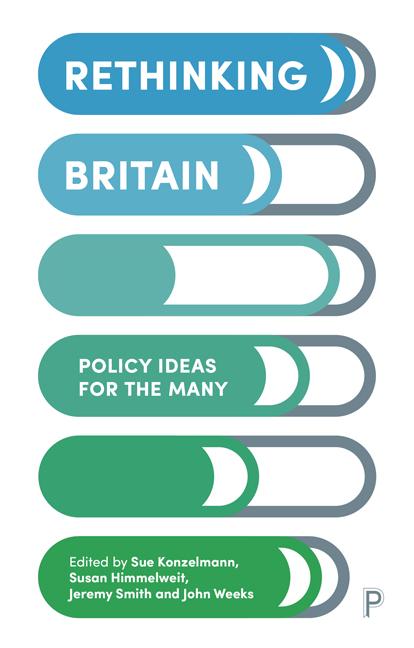Book contents
- Frontmatter
- Contents
- List of Tables and Figures
- The Contributors
- Foreword
- Introduction
- Interlude: ‘Mirror, Mirror, On the Wall – Who has the Highest Debt of All?’
- Part One Building a Full-Employment Economy: Introduction
- Part Two Public Investment – Prioritising Society Rather than Profit: Introduction
- Part Three Making Finance Work for Society: Introduction
- Part Four Genuine Social Security: Introduction
- Part Five How to provide for Social Needs: Introduction
- Conclusion
- Jargon Busters
- References and Further Reading
- Index
Interlude: Why Should Citizens Invest in Losses, Rather than for Profit?
Published online by Cambridge University Press: 11 March 2021
- Frontmatter
- Contents
- List of Tables and Figures
- The Contributors
- Foreword
- Introduction
- Interlude: ‘Mirror, Mirror, On the Wall – Who has the Highest Debt of All?’
- Part One Building a Full-Employment Economy: Introduction
- Part Two Public Investment – Prioritising Society Rather than Profit: Introduction
- Part Three Making Finance Work for Society: Introduction
- Part Four Genuine Social Security: Introduction
- Part Five How to provide for Social Needs: Introduction
- Conclusion
- Jargon Busters
- References and Further Reading
- Index
Summary
As a result of the 2008 financial crisis, taxpayers bailed out the UK banks and financial institutions that caused the trouble in the first place. Not only are we unlikely to see all of that money back, which should have been invested in real services, such as the NHS; we have also been made to endure nearly a decade of austerity as a result of that ‘investment’, degrading public services still further. In effect, we paid for the 2008 crisis twice.
Worse still, the 2008 financial crisis is very unlikely to be the last. Aside from the few decades following the Second World War – when we had international financial regulation – financial crises have usually come along every decade or so, which means that if we don't start to do things differently, the financial sector may well be tapping us up again before much longer. That certainly suggests that, at the very least, we need a system where bailouts are repayable, so that finance doesn't get all the profits while the rest of us just get saddled with paying for the losses. Ideally, of course, strong international regulation should instead vastly reduce the scope for these crises.
This depressing story, however, can be turned on its head. Obviously, if UK citizens can be forced to ‘invest’ billions in failing banks for, at best, no profit, then clearly we would be able to invest in other things instead – things that actually do make a profit – which can then be used to improve the public services we want and value.
Unlike many countries, at present the UK doesn't have a sovereign wealth fund. These are usually funded by exports of commodities, such as, in the case of Norway, oil. Finance, of course, is one of the UK's main exports, and would therefore be an obvious source of funding for at least part of an investment fund for the many.
This does, of course, raise the question of who decides how and when to spend some of the proceeds of this ‘citizens’ wealth fund’. Obviously, deciding how to spend extra money is a far more pleasant problem than trying to work out who picks up an unexpected bill – but it's still a problem.
- Type
- Chapter
- Information
- Rethinking BritainPolicy Ideas for the Many, pp. 97 - 98Publisher: Bristol University PressPrint publication year: 2019



